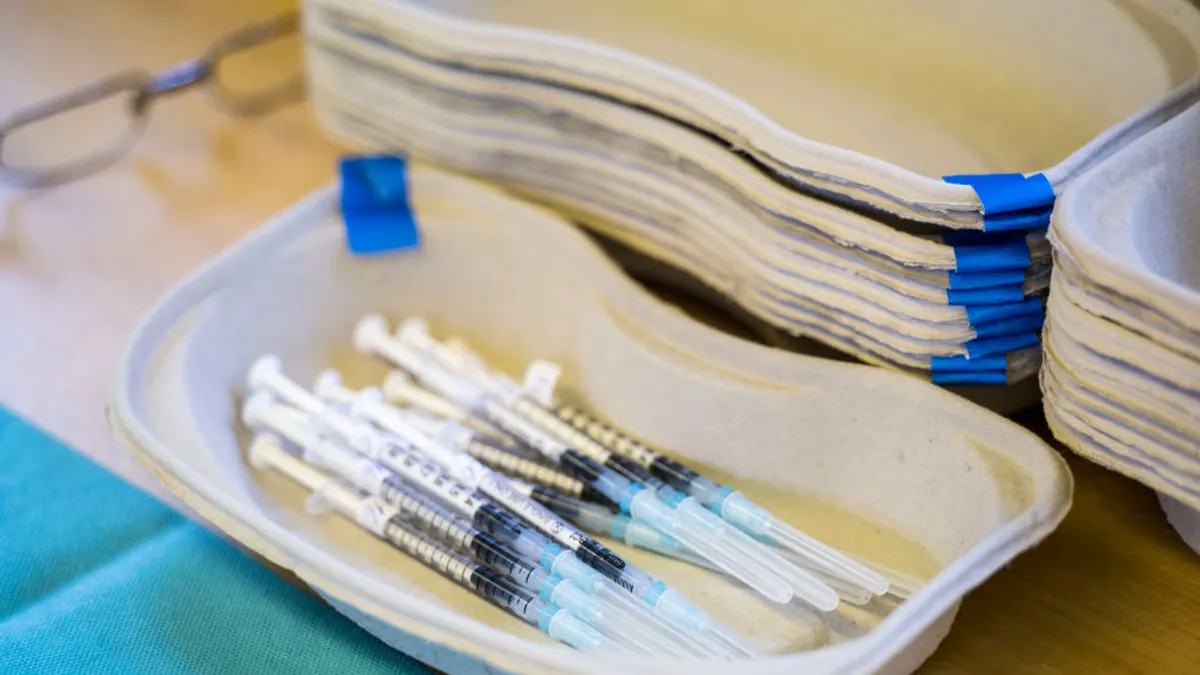Pharma’s sharply declining COVID-19 market is now grappling with a controversial new policy shift.
Last week, HHS Secretary Robert F. Kennedy Jr. announced that the CDC would no longer recommend COVID vaccines for healthy children or pregnant women. Instead, the FDA issued updated guidance prioritizing shots for elderly people or those with health problems.
At the same time, COVID vaccines are facing other challenges including stricter testing standards and a clawback in research funding amid massive cuts at NIH.
On top of these federal changes, some states, including Iowa, Florida and Texas, want to restrict access to mRNA technology entirely or prohibit its use in children.
Despite these headwinds, some biotechs are still attempting to sail the COVID market’s choppy waters.
Navigating the market shifts
Several once-promising biotechs in the space have recently been hit with their own unique setbacks.
GeoVax hoped to secure its market position by targeting an audience still heavily invested in protecting themselves from disease: the immunocompromised. But one of its programs took a hit in April when the Biomedical Advanced Research and Development Authority (a division of HHS) terminated its ProjectNextGEN award. The company vowed to continue work on its phase 2 COVID vaccines and booster shots, and also has a cancer treatment in mid-stage trials along with several preclinical assets if its COVID aspirations ultimately falter.
Other startups who found limited traction in the COVID market have aimed to win expanded indications that could fuel growth. Now, one company taking that route — InflaRx — is facing new challenges. The biotech’s lead monoclonal antibody vilobelimab, which already has an FDA emergency use nod for some hospitalized COVID patients, was being tested for a rare inflammatory skin condition called pyoderma gangrenosum. But hopes that it could win a new approval were dashed last week after a trial monitoring committee recommended the company halt its phase 3 trial due to futility.
“While the outcome is not what we had hoped it would be, InflaRx remains committed to its goal of developing new therapies for underserved patients with chronic immune-dermatological conditions, including with our oral [version of the drug], with data expected this summer,” Niels Riedemann, CEO and founder of InflaRx, said in a written release.
Adapting to a new reality
Other COVID-focused companies think they can still find an edge in the market.
For Invivyd, the aim is to pivot from the pandemic phase of the virus to the endemic phase. And as the world looks at how to protect itself for the long haul, Invivyd is trying to position its antibody-based therapies to play a prominent role.
Invivyd also faced a setback this year when the FDA denied its bid to expand its existing emergency use authorization for its monoclonal antibody, Pemgarda, to treat mild-to-moderate COVID in immunocompromised patients who have exhausted their options. The current EUA indication is to prevent COVID infections in some immunocompromised patients.
Pemgarda’s 2024 sales of $25 million fell short of initial net product revenue guidance of $150 to $200 million. But sales then ticked up at the end of last year, according to the company.
“We are pleased with the significant Pemgarda revenue growth of 48% in the fourth quarter, reflecting increased provider awareness and adoption,” Bill Duke, chief financial officer of Invivyd, said in a written release.
This year, however, sales dipped again in the first quarter to $11.3 million amid a company transition to an in-house sales force. Invivyd leaders said revenue is now poised to accelerate in the second quarter.
And with vaccines under fire, monoclonal antibodies may be able to pick up where the shots leave off, said Marc Elia, Invivyd’s chairman of the board of directors. While some vaccines, like one for measles, can halt transmission, COVID isn’t as easily tamed by a jab, and even though they prevent the virus’ worst effects, they still allow it to circulate and spread.
“Our perception is that you will never vaccinate your way out of that problem. It’s not really a function of technology, it's just a function of host-pathogen biology,” Elia said.
Antibody-based options may boost protection. The company’s phase 3 CANOPY trial of Pemgarda demonstrated an 84% relative risk reduction in symptomatic COVID in immunocompromised patients compared with a placebo during the six-month study.
“The vision for the company is to continue innovating and offering more convenient, potent, safe antibodies until most anyone who wishes a higher degree of protection can access that protection,” Elia said. “I think, as a country, we were well trained to appreciate the power of a vaccine. And there's a complementarity between a monoclonal and a vaccine for any disease.”




















